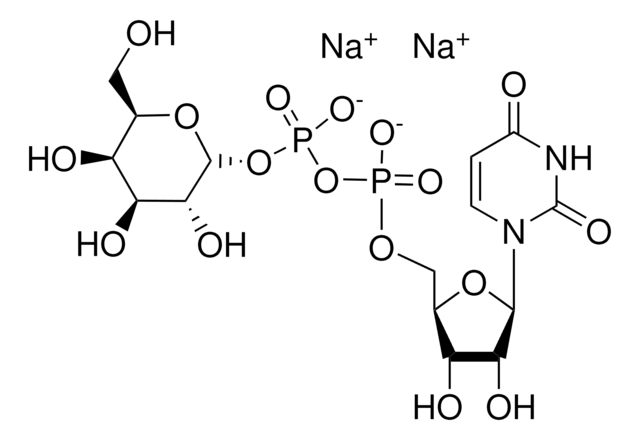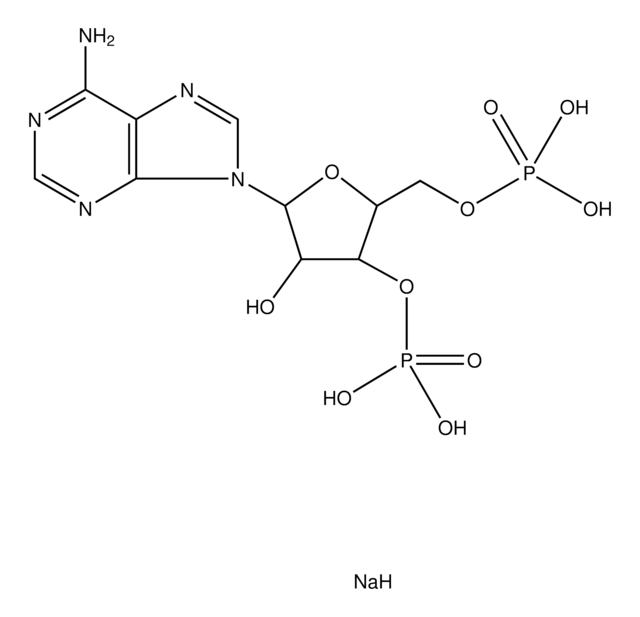U6751
Uridine 5′-diphosphoglucuronic acid trisodium salt
98-100%
Synonym(s):
UDP-GlcA, UDPGA, Uridine-diphosphate-glucuronic acid trisodium salt, Uridine[5′]diphospho[1]-α-D-glucopyranosuronic acid trisodium salt
About This Item
biological source
bovine liver
rabbit muscle
yeast
Assay
98-100%
form
powder
storage temp.
−20°C
SMILES string
[Na+].[Na+].[Na+].O[C@@H]1[C@@H](O)[C@H](O[C@@H]([C@H]1O)C([O-])=O)OP([O-])(=O)OP([O-])(=O)OC[C@H]2O[C@H]([C@H](O)[C@@H]2O)N3C=CC(=O)NC3=O
InChI
1S/C15H22N2O18P2.3Na/c18-5-1-2-17(15(26)16-5)12-9(22)6(19)4(32-12)3-31-36(27,28)35-37(29,30)34-14-10(23)7(20)8(21)11(33-14)13(24)25;;;/h1-2,4,6-12,14,19-23H,3H2,(H,24,25)(H,27,28)(H,29,30)(H,16,18,26);;;/q;3*+1/p-3/t4-,6-,7+,8+,9-,10-,11+,12-,14-;;;/m1.../s1
InChI key
XXXUNWUNTOMVIG-QWGSIYABSA-K
Looking for similar products? Visit Product Comparison Guide
Application
Biochem/physiol Actions
Storage Class Code
11 - Combustible Solids
WGK
WGK 3
Flash Point(F)
Not applicable
Flash Point(C)
Not applicable
Personal Protective Equipment
Regulatory Listings
Regulatory Listings are mainly provided for chemical products. Only limited information can be provided here for non-chemical products. No entry means none of the components are listed. It is the user’s obligation to ensure the safe and legal use of the product.
JAN Code
U6751-1G:
U6751-VAR:
U6751-25MG:
U6751PROC:
U6751-2G:
U6751-BULK:
U6751-CP:
U6751-250MG:
U6751-500MG:
U6751-5MG:
U6751-100MG:
U6751-10MG:
Certificates of Analysis (COA)
Search for Certificates of Analysis (COA) by entering the products Lot/Batch Number. Lot and Batch Numbers can be found on a product’s label following the words ‘Lot’ or ‘Batch’.
Already Own This Product?
Find documentation for the products that you have recently purchased in the Document Library.
Customers Also Viewed
Articles
Glycosyltransferases were initially considered to be specific for a single glycosyl donor and acceptor, which led to the one enzyme-one linkage concept. Subsequent observations have refuted the theory of absolute enzymatic specificity by describing the transfer of analogs of some nucleoside mono- or diphosphate sugar donors.
Our team of scientists has experience in all areas of research including Life Science, Material Science, Chemical Synthesis, Chromatography, Analytical and many others.
Contact Technical Service




